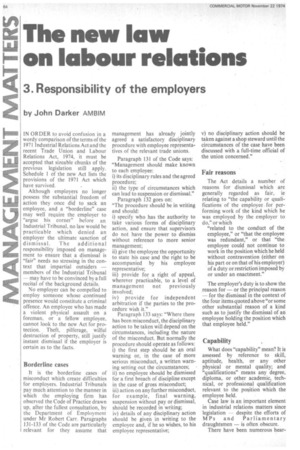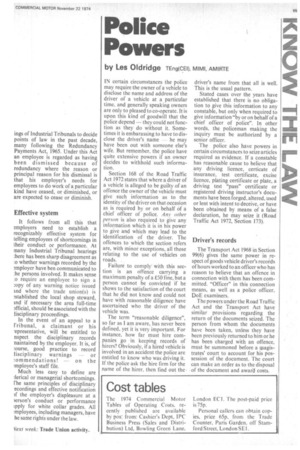The new law on labour relations
Page 66

Page 67

If you've noticed an error in this article please click here to report it so we can fix it.
3. Responsibility of the employers
by John Darker AMBIM
IN OR DER to avoid confusion in a wordy comparison of the terms of the 1971 Industrial Relations Act and the recent Trade Union and Labour Relations Act, 1974, it must he accepted that sizeable chunks of the previous legislation still apply. Schedule I of the new Act lists the provisions of the 1971 Act which have survived.
Although employers no longer possess the substantial freedom of action they once did to sack an employee, and a "borderline" case may well require the employer to "argue his corner" before an Industrial Tribunal, no law would be .practicable which denied an employer the ultimate sanction of dismissal. The additional responsibility imposed on management to ensure that a dismissal is "fair" needs no stressing in the context that impartial outsiders — members of the Industrial Tribunal may have to be convinced by a full recital of the background details.
No employer can be compelled to employ someone whose continued presence would constitute a criminal offence. An employee who has made a violent physical assault on a foreman, or a fellow employee, cannot look to the new Act for protection. Theft, pilferage, wilful destruction of property, still justify instant dismissal if the employer is certain as to the facts.
Borderline cases
It is the borderline cases• of misconduct which create difficulties for employers. Industrial Tribunals pay much attention to the manner in which the employing firm has observed the Code of Practice drawn up, after the fullest consultation, by the Department of Employment under Mr Robert Carr. Paragraphs 131-133 of the Code are particularly relevant for they assume that management has already jointly agreed a satisfactory disciplinary procedure with employee representatives of the relevant trade unions.
Paragraph 131 of the Code says: "Management should make known to each employee: i) its disciplinary rules and the agreed procedure; ii) the type of circumstances which can lead to suspension or dismissal." Paragraph 132 goes on: "The procedure should be in writing and should: I) specify who has the authority to take various forms of disciplinary action, and ensure that supervisors do not have the power to dismiss without reference to more senior management; ii) give the employee the opportunity to state his case and the right to be accompanied by his employee representative; iii) provide for a right of appeal, wherever practicable, to a level of management not previously involved; iv) provide for independent arbitration if the parties to the procedure wish it."
Paragraph 133 says: "Where there has been misconduct, the disciplinary action to be taken will depend on the circumstances, including the nature of the misconduct. But normally the procedure should operate as follows: i) the first step should be an oral warning or, in the case of more serious misconduct, a written warning setting out the circumstances; ii) no employee should be dismissed for a first breach of discipline except in the case of gross misconduct; iii) action on any further misconduct, for example, final warning, suspension without pay or dismissal, should be recorded in writing; iv) details of any disciplinary action should be given in writing to the employee and, if he so wishes, to his employee representative; v) no disciplinary action should be taken against a shop steward until the circumstances of the case have been discussed with a full-time official of the union concerned."
Fair reasons
The Act details a number of reasons for dismissal which are generally regarded as fair, ie relating to "the capability or qualifications of the employee for performing work of the kind which he was employed by the employer to do," or which "related to the conduct of the employee," or "that the employee was redundant," or that "the employee could not continue to work in the position which he held without contravention (either on his part or on that of his employer) of a duty or restriction imposed by or under an enactment."
The employer's duty is to show the reason for — or the principal reason for the dismissal in the context of the four items quoted above "or some other substantial reason of a kind such as to justify the dismissal of an employee holding the position which that employee held."
Capability
What does "capability" mean? It is assessed by reference to skill, aptitude, health, or any other physical or mental quality; and "qualifications" means any degree, diploma, or other academic, technical, or professional qualification relevant to the position which the employee held.
Case law is an important element in industrial relations matters since legislation despite the efforts of MPs and Parliamentary draughtsmen — is often obscure. There have been numerous hear ings of Industrial Tribunals to decide points of law in the past decade, many following the Redundancy Payments Act, 1965. Under this Act an employee is regarded as having been dismissed because of redundancy where the reason or principal reason for his dismissal is that his employer's needs for employees to do work of a particular kind have ceased, or diminished, or are expected to cease or diminish.
Effective system
It follows from all this that t.mployers need to establish a recognizably effective system for telling employees of shortcomings in their conduct or performance. At many Industrial Tribunal hearings :here has been sharp disagreement as ;ct whether warnings recorded by the :mployer have ben communicated to le persons involved. It makes sense o require an employee to sign a :opy of any warning notice issued Ind where the trade union(s) is :stablished the local shop steward, tnd if necessary the area full-time Aficial, should be associated with the lisciplinary proceedings.
In the event of an appeal to a fribunal, a claimant or his .epresentative, will be entitled to nspect the disciplinary records naintained by the employer. It is, of :ourse, good practice to record lisciplinary warnings -or :ommendations! — on the !mployee's staff file.
Much less easy to define are lerical or managerial shortcomings. Ile same principles of disciplinary ecordings and effective notification if the employer's displeasure at a ierson's conduct or performance tpply for white collar grades. All rriployees, including managers, have he same rights under the law.
Vext week: Trade Union activity.




















































































































